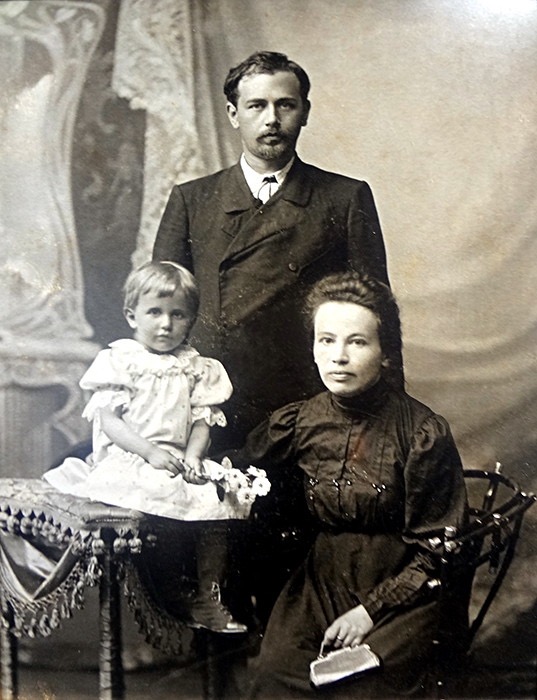Ukrainian composer Mykola Leontovich worked on arrangements of folk song all his life and stopped until the fifth variation. The first edition appeared in 1918. Since 1919, "Shchedryk" is beginning to translate into other languages. In 1919 it was translated to Czech language, in 1920 - to German, French, English. And in that year Kiev Saint Volodymyr University Choir took Leontovych track in the world. The choir provided popular Ukrainian music. On many pictures of that tour are many people. On the concert in Mexico City in December 24th, 1922 were presented 32.600 people ! There were nobody of participants of the choir named after Leontovych, who returned to Soviet Ukraine.
Later "Shchedryk" was Americanized and a New Year song turned into the Christmas song. It refers to the bells that alert the world about the birth of Christ. Today there are about 100 versions of "Shchedryk". In 1974 only in USA were about 600 editions and 50 vinyl records.
Music Leontovych family has always been important. Father of the future composer Dmytro Feofanovych loved to sing and played the harp, balalaika, guitar, violin. Little Mykola (Nicholas) often heard his father's game, have studied instruments. Especially loved the violin. Brothers and sisters of Nicholas also liked singing, participated in choral singing.
A lot of time Nicholas gave music classes while studying in Kamenetz-Podilsky seminary. His musical abilities have attracted the attention of teachers. Nicholas bishop was invited to sing in the choir.
...Mykola (Nicholas) Dmytrovych Leontovych was born in 1877 in Monastyrok village of Bratslav district, Vinnytysa region. His childhood took place in village Shershni ("hornets" from Ukrainian), near Tyvriv town. There he studied literacy in local teacher Pavlo (Paul) Tarnohorodsky. Subsequently a boy entered to Nemyriv town school, then studied at a religious school in Shargorod town. During the holidays he with his mother read works of Shevchenko, sang folk songs with her.
Song skirts world took it as early as adolescence. Many Ukrainian songs Mykola Leontovych recorded in the village Novoselytsia of Lityn district and village Bilousivtsi of Bratslav district. Songs recorded by peasants became for him a kind of artistic academy.
After the seminary Mykola became a teacher at school of Chukiv village, near Nemyriv town. Around him cling rural youth. On his own funds he buys the orchestra, teaches playing on instruments of all who had the ability. For school choir Mykola cultivated folk songs. Nature has endowed his unrivaled talent for handling folk song choir. However, in his musical heritage, there are much: independent music, opera, choral, orchestral. Majestic and at the same time sincerely sounds a church music, written by Leontovych.

In 1916 the recognition came to composer. It happened during a Christmas concert on December, 25th after the student choir of Kyiv University of famous works of Leontovych "Shchedryk". Students felt the charm, grandeur, transparency of the work. Among other masterpieces praise the outstanding composer brought his arrangements of folk songs "Oh descended star", "spinning", "warned by the river", "Dudaryk", "Kozak bear." "Shchedryk" of Leontovych extremely popular in Northern America and Western Europe. There he was known under the name "Carol of the Bells" (also known as the "Ukrainian Bell Carol") and be sure to insert into the Christmas concerts as a musical masterpiece. Throughout the composition, Leontovych used a four note motif as an ostinato which was taken from an ancient pagan Ukrainian New. Origin : Ukrainian pre Christian Traditional Spring Ritual Song.
Overthrow of the monarchy in Russia February 1917 revived the emancipatory of aspirations in Ukraine. Kyiv has begun to seethe political and artistic life. Mykola Leontovich repeatedly traveled to Kyiv, the capital, called friends - Ukrainian composer, choral conductor, music critic and teacher and priest Kyrulo (Cyril) Stetsenko; composer Pylyp Kozytsky; choral conductor, composer, folklorist and teacher Olexandr Koshyts (Alexander Koshetz). Musical meetings, political demonstrations, creating choral music filled the church for Ukrainian composer's life and inspiration anxiety. But the hardships the family demanded that Mykola returned home to Tulchyn town.
In Tulchyn Mykola worked as a music teacher of diocesan school and the church choir leader. This was the heyday of his talent. His school concerts were so wonderful and well-known in his time that they gathered from all the surrounding villages and towns, from Nemyriv, Vinnytsia, Kamenets, even from Odessa and Kyiv. Listen to the church choir converge as many people as could fit ladder and platform before the church. In October, 1920 the famous choir led by Kyrylo (Cyril) Stetsenko specifically visited to Leontovych at the travel time around Ukraine.
After Christmas, 1921 Mykola Leontovych went out from Tylchyn to his parents to Markivka village of Haisyn district. That was an anxious time, travel was dangerous. Parents house met Leontovych with a hospitality and family warmth. But later in the evening, someone knocked. It was an officer of soviet secret police CheKa (KGB). He said he conducting the fight against banditry. He demanded dinner and overnight stay. The guest put to bed in the same room with Leontovych. Before the morning of that room there was a shot, unknown officer robbed a house . KGB bullet took the life of the talented Ukrainian composer. The text of the report, which reveals the name of the murderer of composer - Hryshcneko, was published only in 1990th, after USSR.
